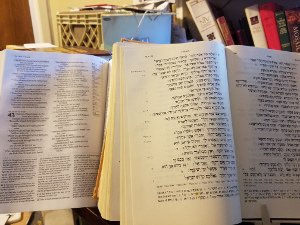Culture, Translation, and Literal Meaning
I just read two excellent articles on Bible translation, one on a blog, and the other coming to me via e-mail. It seems to be very difficult for people to get an idea of just how language works. The notion that each word has a fixed, eternal, precise meaning just seems to hang on. Learning a foreign language will help, as will reading material from earlier in your own language’s history.
The first article is by fellow Moderate Christian Blogroll member Eddie Sue Arthur [I originally credited this article to Eddie, but it is really by Sue. I apologize deeply for miscrediting it] who asks Can you close the door?. It may seem simple enough, but as Sue will demonstrate, it can be somewhat more complicated than that for Bible translators. Not only do words mean different things at different times and in different places, but they also occur in idiomatic expressions in which the word isn’t unit of meaning at all.
Sue’s article is straightforward and simple, and I recommend it to anyone who is struggling to understand why Bible translation cannot be a more absolute and objective process.
The second article came via the Bible Translation Mailing List which presents an article by Kermit Titrud titled Critique of the English Standard Version and Are Only Some Words of Scripture Breathed Out By God by Wayne Grudem in Translating Truth: The Case for Essentially Literal Bible Translation. Wheaton, Il.: Crossway Books, 2005. (You have to say that title on one breath or it doesn’t count!)
Update: This article is now also available on the Better Bibles Blog.
This article examines translations in the [tag]ESV[/tag] and in [tag]dynamic equivalence[/tag] translations that are criticized by Wayne Grudem. The fundamental issue is the same. Languages are very different and finding equivalent expressions requires effort and often will not look very much like the form of the original at all.
I strongly recommend both of these articles, and for non-specialists especially the first.

Actually, Henry, you don’t need to apologise for miscrediting Sue’s article. I’m almost sure that it went on the site originally in Eddie’s name, and was then edited to correct the author’s name to Sue. But you do need to correct a later mention from “Eddie” to “Sue”. Yes indeed, an excellent insight into why Bible translation is so difficult.
Good catch there. I’m not sure how it was when I first read it, but I published without checking links, and when I went back to check them, I noticed the author was Sue. So it doesn’t hurt me to apologize!
If they want to leave people scratching their heads wondering what their loins are and what they should gird them with, that’s their problem. I’ll continue to be in favor of a modern equivalent – perhaps rolling up sleeves. After all, if the authors of the New Testament Gospels had considered the precise wording of Jesus’ sayings paramount, rather than communicating them in translation to the widest possible audience, then presumably they would have written in Aramaic, and told everyone to learn it if they want to really understand Jesus’ teachings.
Your proposal is certainly a reasonable one, with which I agree.
Yes, I’m sorry for the confusion, Henry. All emailed posts to our blog come in my name for reasons particular to WordPress. When Sue posted her article (she can only email from her current location) I was in Paris watching England play in the Rugby World Cup and not able to change the author tag for a couple of days. That being said, I wouldn’t mind taking the credit for Sue’s excellent little article!